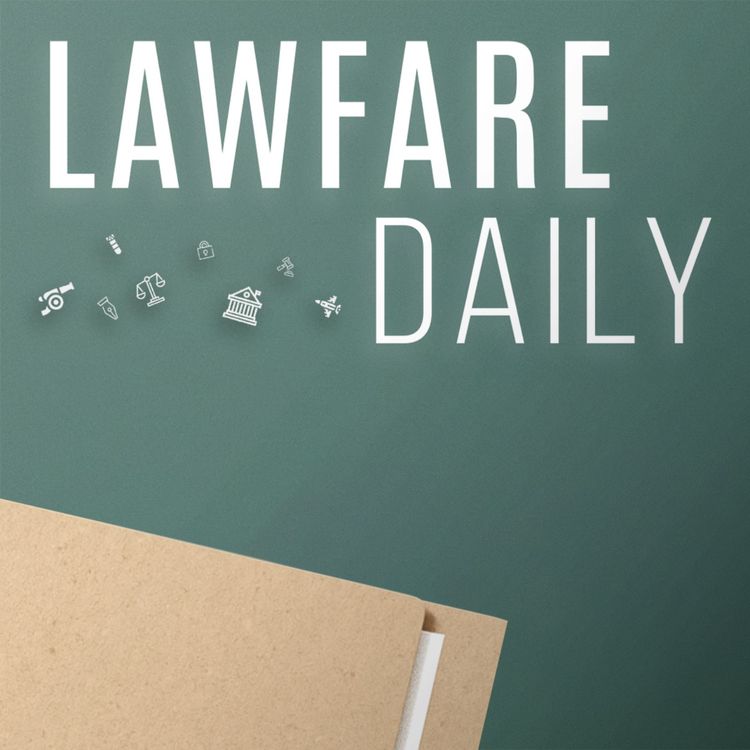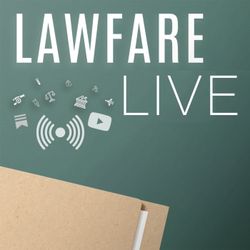Share

The Lawfare Podcast
Lawfare Daily: Ukraine’s Past and Future with NATO
•
Ukraine has been pursuing NATO membership for many years. But what realistic options does it have in light of Russia’s full-scale invasion? Historian and author of a book about tensions between the NATO and Russia “Not One Inch,” Mary Sarotte, sits down with Lawfare Ukraine Fellow Anastasiia Lapatina to describe what lessons Ukraine can take from the cases of Norway and West Germany.
To receive ad-free podcasts, become a Lawfare Material Supporter at www.patreon.com/lawfare. You can also support Lawfare by making a one-time donation at https://givebutter.com/c/trumptrials.
More episodes
View all episodes

Lawfare Daily: The Tariffs Decision and What Comes Next
54:18|For today’s episode, Lawfare Senior Editor Scott R. Anderson sits down with three leading scholars from the Georgetown University Law Center—Professor Kathleen Claussen, Professor Marty Lederman, and Visiting Scholar Peter Harrell of the Institute of International Economic Law—to talk through the Supreme Court’s groundbreaking opinion in Learning Resources, Inc v. Trump, which invalidated the array of global tariffs that the Trump administration had imposed using the International Emergency Economic Powers Act (IEEPA).Together, Scott and his guests break down the Court’s opinion, weigh what it might mean for the Major Questions Doctrine and foreign relations law, and look ahead to the legal fights to come over the other tariff authorities the Trump administration is now using to pursue its agenda.To receive ad-free podcasts, become a Lawfare Material Supporter at www.patreon.com/lawfare. You can also support Lawfare by making a one-time donation at https://givebutter.com/lawfare-institute.
Lawfare Daily: The Pentagon Designates Anthropic as a Supply Chain Risk
54:14|In a live conversation on March 2, Lawfare Editor in Chief Benjamin Wittes spoke to Lawfare Senior Editor and Research Director Alan Rozenshtein about the Pentagon's designation of AI company Anthropic as a supply chain risk, the implications of a designation, how other AI companies have reacted, and the legal challenges the designation may face.Read Rozenshtein’s article on the topic, co-authored with Michael Endrias, here.To receive ad-free podcasts, become a Lawfare Material Supporter at www.patreon.com/lawfare. You can also support Lawfare by making a one-time donation at https://givebutter.com/lawfare-institute.
Lawfare Daily: The Trials of the Trump Administration, Feb. 27
01:41:24|In a live conversation on YouTube, Lawfare Editor in Chief Benjamin Wittes sat down with Lawfare Senior Editors Scott R. Anderson, Roger Parloff, Molly Roberts, Anna Bower, and Alan Rozenshtein, and Lawfare Public Service Fellow Troy Edwards to discuss the superseding indictment in the case against Don Lemon and his co-defendants in Minnesota, the standoff between the Department of Defense and Anthropic, the firing of FBI agents who worked on the classified documents case, and more.You can find information on legal challenges to Trump administration actions here. And check out Lawfare’s new homepage on the litigation, new Bluesky account, and new WITOAD merch.To receive ad-free podcasts, become a Lawfare Material Supporter at www.patreon.com/lawfare. You can also support Lawfare by making a one-time donation at https://givebutter.com/lawfare-institute.
Lawfare Live: U.S. and Israel Strike Iran
01:00:15|At 9 am ET on March 1, Lawfare Editor in Chief Benjamin Wittes sat down with Lawfare Public Service Fellows Ariane Tabatabai and Troy Edwards Lawfare Senior Editor Scott R. Anderson to discuss the U.S. and Israeli strikes on Iran, the death of Ayatollah Ali Khamenei, Iran's response, and what may happen next.
Lawfare Archive: Stephanie Leutert on Violence in Mexico and Central America
37:41|From October 8, 2016: Stephanie Leutert, the Mexico Security Initiative Fellow at the University of Texas at Austin and the author of Lawfare's "Beyond the Border" series, joined Benjamin Wittes on this week's podcast to talk about the epidemic of violence plaguing Mexico and Central America. Despite the brutality, extremity, and remarkable scale of the violence going on immediately to our south, those of us in the United States who work and think on national security issues rarely consider it to be relevant to national security. Why is that? How bad is the violence in these countries? What's causing the crisis, and the waves of migration it generates, in the first place? And what, if anything, can be done to stop it?To receive ad-free podcasts, become a Lawfare Material Supporter at www.patreon.com/lawfare. You can also support Lawfare by making a one-time donation at https://givebutter.com/lawfare-institute.
Lawfare Archive: Trump’s Tariffs and the Law
46:01|From February 27, 2025: For today’s episode, Lawfare Senior Editor Scott R. Anderson sat down with Kathleen Claussen, an expert in international economic law and professor at the Georgetown University Law Center, and Lawfare Contributing Editor Peter Harrell, a non-resident senior fellow at the Carnegie Endowment for International Peace, to discuss the ambitious set of tariffs the Trump administration has imposed or threatened over its first month in office.They discussed the tariffs Trump has imposed so far, what seems to be coming over the horizon, and how they all line up with the legal authorities he is using to impose them.To receive ad-free podcasts, become a Lawfare Material Supporter at www.patreon.com/lawfare. You can also support Lawfare by making a one-time donation at https://givebutter.com/lawfare-institute.
Lawfare Daily: Patronage Pardons: A Conversation with Prof. Lee Kovarsky about a Novel Feature of the Trump Administration
41:38|Lee Kovarsky, an endowed chair professor at the University of Texas School of Law, speaks with Senior Editor Roger Parloff about patronage pardons, the subject of his forthcoming article in the Duke Law Journal.Patronage pardons are pardons a president issues to reward and possibly even induce criminality by political supporters. Kovarsky discusses whether the founders anticipated such pardons, gives examples of such pardons, explores how they differ from ordinary pardons, and ponders whether anything can be done to rein them in.To receive ad-free podcasts, become a Lawfare Material Supporter at www.patreon.com/lawfare. You can also support Lawfare by making a one-time donation at https://givebutter.com/lawfare-institute.
Lawfare Live: Unpacking the Kilmar Abrego Garcia Hearing with Anna Bower
28:11|In a Feb. 26 Lawfare Live, Lawfare Editor in Chief Benjamin Wittes and Lawfare Senior Editor Anna Bower discussed the evidentiary hearing in the Kilmar Abrego Garcia criminal case which focused on the motion to dismiss for vindictive prosecution. This episode is a part of Lawfare’s new livestream series, Lawfare Live: The Now. Subscribe to Lawfare on Substack or YouTube to receive an alert for future livestreams. To receive ad-free podcasts, become a Lawfare Material Supporter at www.patreon.com/lawfare. You can also support Lawfare by making a one-time donation at https://givebutter.com/lawfare-institute.
Rational Security: The “Off the Rails” Edition
01:16:33|This week, Scott was joined by Lawfare Managing Editor Tyler McBrien, Lawfare Senior Editor Molly Roberts, and University of Virginia Professor of Law Paul Stephan to talk through the week’s big news in national security, including:“Textual Healing.” On Friday, a 6-3 Supreme Court majority brought an end to at least the current iteration of President Trump’s controversial tariff policies, ruling that language in the International Emergency Economic Powers Act (or IEEPA) authorizing the “regulation of…importation” doesn’t include the authority to impose tariffs. That said, President Trump himself has already indicated that he intends to reinstate many of the tariffs he had installed using IEEPA under other statutory authorities. How big a setback is this for the Trump administration’s trade policies? And what might it mean for other aspects of its policy agenda?“Mayhem in Mexico.” Over the weekend, an elite unit of the Mexican army killed one of the country’s most powerful drug kingpins, Nemesio Oseguera Cervantes, also known as “El Mencho.” His syndicate, the Jalisco New Generation Cartel, immediately retaliated, through attacks on Mexican security forces, roadblocks throughout the country, and other measures intended to terrorize the public, particularly in areas frequented by American and Western tourists. The decision to move against El Mencho followed an intense pressure campaign by the Trump administration, which has pushed Mexican President Claudia Sheinbaum to take a hard stand against the cartels. Should this be seen as a win for the Trump administration? Or Sheinbaum? And what could the long-term implications be for the U.S.-Mexico relationship?“Clap if You Believe.” On Tuesday, President Trump delivered his annual State of the Union address, the longest of its kind. Many had braced for a contentious speech, expecting Trump to ridicule the justices seated in front of him and potentially even announce strikes on Iran. But Trump appeared to pull his punches on both of those fronts—he instead saved his harshest words for congressional Democrats and focused on laying out a rose-colored picture of the state of the country. How effective was Trump’s speech? And what does it tell us about the current state of his second presidency?In object lessons, Tyler just has this strange sense that you will enjoy the Otherworld podcast. Molly (and her dog) find comfort in the soft, squishy claws of Cthulhu. Scott eased his travel woes with a twist on the Vieux Carre at Birch & Bloom in Charlottesville. And Paul mixed his object lesson with three parts: Peter Suderman’s Cocktails if you’re into all things shaken and stirred; Mark Galeotti's podcast, In Moscow’s Shadow, if you’re into all things Russia-related; and Dan Wang’s New York Times Best Seller book, “Breakneck,” if you’re into all things China-related. To receive ad-free podcasts, become a Lawfare Material Supporter at www.patreon.com/lawfare. You can also support Lawfare by making a one-time donation at https://givebutter.com/lawfare-institute.